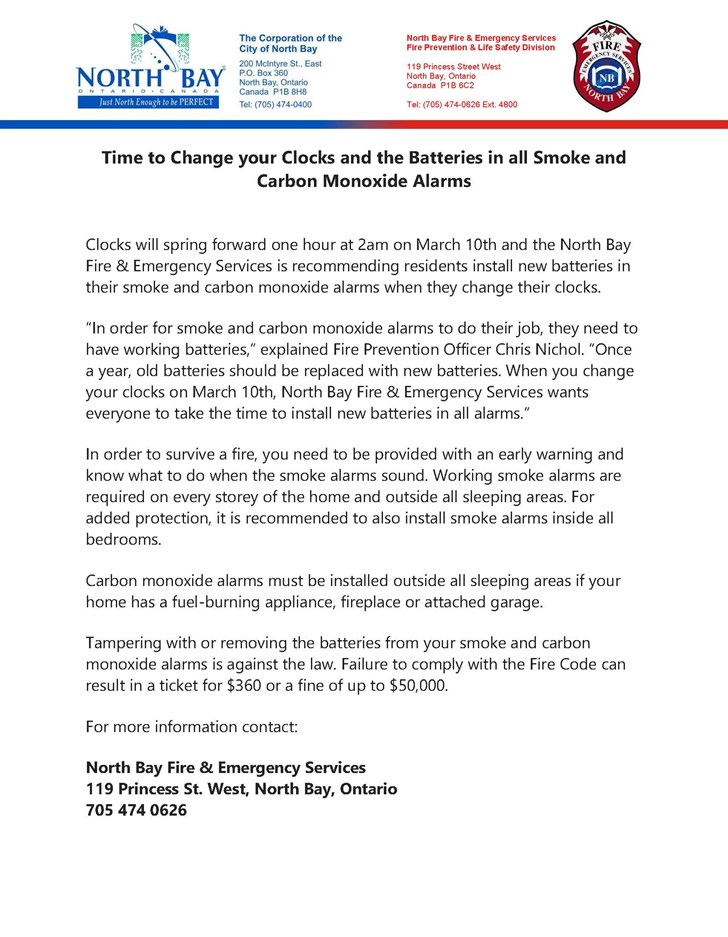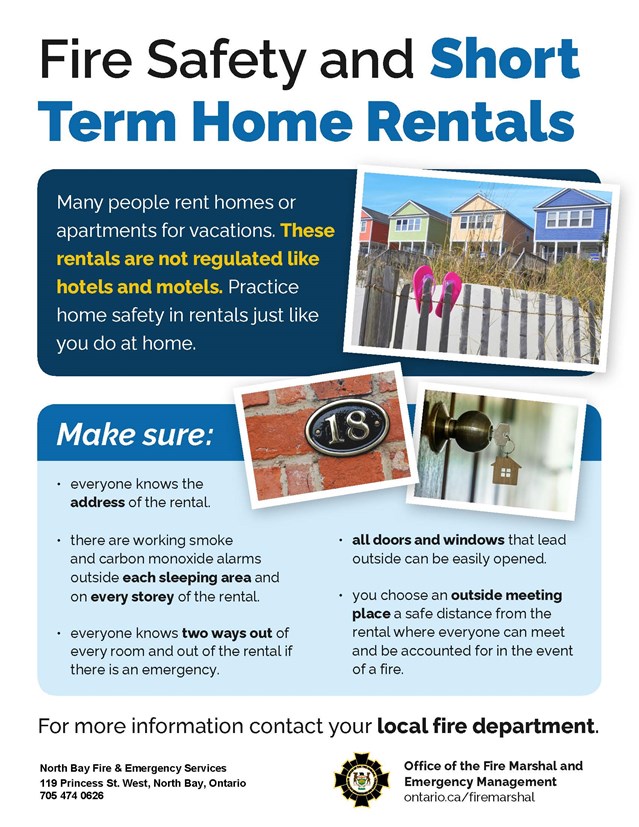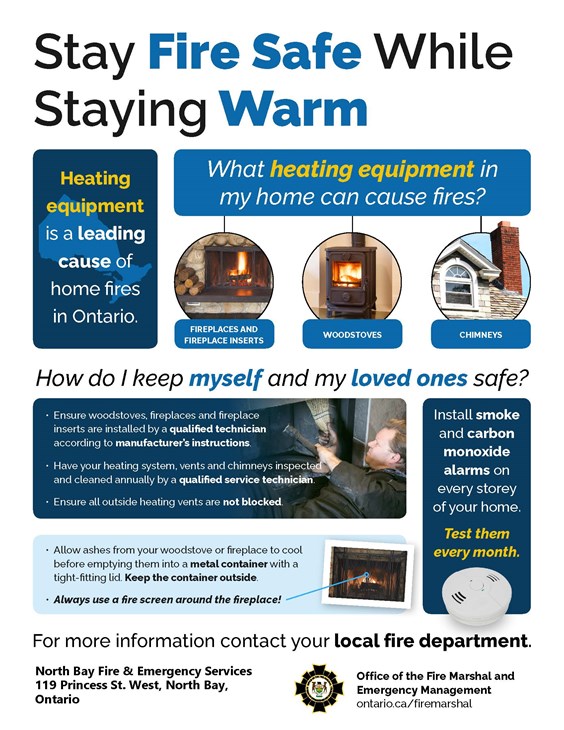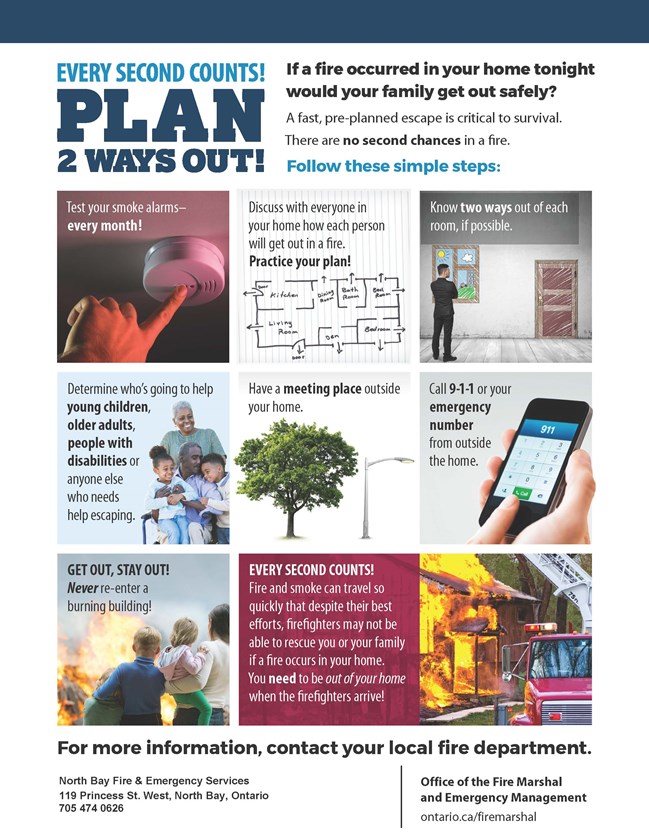
-
New Carbon Monoxide Alarm Rules Jan.2026
CARBON MONOXIDE
ALARM RULES
EXISTING HOMES
Attention Homeowners & Landlords,
New Safety Requirements Starting January 1, 2026
Carbon monoxide (CO) is an invisible, odourless, and deadly gas. Keeping your family safe means ensuring you have working CO alarms properly installed in your home.
New requirements are coming into effect on January 1, 2026, that expand where CO alarms must be placed in existing homes.Where Do the New Requirements Apply?
The updated requirements apply to all existing homes that have any of the following:
• A fuel-burning appliance (like a furnace, water heater, or stove that uses natural gas, propane, oil, or wood).
• A fireplace.
• An attached garage.
• Effective Jan 1, 2026: Air for heating that comes from a fuel-burning appliance not contained within the home (e.g., an appliance in a utility shed).Common types of homes include:
- Detached or Semi-Detached Houses
- Townhouses
- Cottages
Where Must CO Alarms Be Installed?
If your home meets any of the conditions above, you must install a CO alarm in these two locations:
1. Adjacent to each sleeping area (near all bedrooms).
2. Effective Jan 1, 2026: On every storey (floor) of your home, including storeys that do\not have a sleeping area.CO alarm installation requirements are outlined in Section 2.16 of Division B of the Fire Code (O. Reg. 213/07)
Buying and Installing Your CO Alarms
Buying
When buying a CO alarm, make sure it has the logo of a recognized standards testing agency to ensure they meet Canadian performance standards. Some examples of recognized standards testing agencies and their logos include:o Canadian Standards Association (CSA)
o Underwriters Laboratories of Canada (ULC)
o Intertek (ETL)• Under the Fire Code, carbon monoxide alarms are permitted to be:
o Hardwired (connected directly to an electrical system).
o Battery-operated (portable or permanently mounted).
o Plug-in devices (plugs into a standard electrical outlet).
• Many devices on the market are combined units that include both a smoke alarm and carbon monoxide alarm in one device.Installing
Follow the manufacturer’s instructions for installation and placement of CO alarms.
Who is Responsible for Compliance?
• In Owner-Occupied homes, the Homeowner is responsible for complying with the CO alarm requirements in the Fire Code.
• In Rental Homes, the Landlord is responsible for complying with the CO alarm requirements in the Fire Code.Need Clarification?
For questions about CO alarm requirements that may apply to your home, please contact your local fire department. They are the authority responsible for enforcing the Fire Code in your area.
CO alarm installation requirements are outlined in Section 2.16 of Division B of the Fire Code (O. Reg. 213/07).

-
July 2025
July Fire Safety Tips!
Vacation Fire Safety
Heading out on vacation? Don’t forget to pack your fire safety gear! Check your smoke alarms before you leave and ensure they're working. Safety first, adventure second!
Cooking on vacation? Keep an eye on the stove! Never leave it unattended, and keep flammable items away. Let’s keep the fun going without any fiery surprises!
Grilling while on vacation? Always keep your BBQ or grill at least 10 feet away from structures and never leave it unattended. Let’s sizzle safely
Planning a campfire? Keep it small, and always have water or a shovel nearby to extinguish it. When you’re done, make sure it’s completely out—no smoldering embers allowed!
Staying in a rental? Check for smoke and carbon monoxide alarms as soon as you arrive! Make sure they’re working. Your safety is as important as that lake view!
Using gadgets on vacation? Avoid overloading outlets and unplug devices when not in use. Let’s keep those sparks flying only in the sky!
Before you head out for fun, know your escape routes in case of fire. Share your plan with your travel buddies—teamwork makes safety work!
Summer Fire Safety
If you’re lighting up the sky with fireworks, let the pros handle it! Sit back, relax, and enjoy the dazzling display safely. What’s your favourite firework memory?
Firing up the BBQ? Keep that grill at least 10 feet away from buildings and never leave it unattended. Let’s keep the flames where they belong—on the grill, not in the backyard! What’s on your grill today?
Heading to the beach? Remember to dispose of cigarettes properly. One tiny spark can lead to a massive wildfire. Let’s keep our beaches beautiful and safe for everyone!
Enjoying the great outdoors this weekend? Always fully extinguish campfires before leaving your site or hitting the hay. Safety first means more fun later! What’s your favourite camping story?
Summer heat can be intense, so keep that water bottle handy! Staying hydrated helps you stay alert and prevents heat-related illnesses. What’s your go-to summer drink?
-
June 2025
Week 1: Fire Safety for Older Adults
🚬🌳 Smokers, take it outside! Your lungs (and your home) will thank you. Use sturdy ashtrays and make sure those butts are out! Safety first, then puff away!
🔥↔️ 🛋️ Space heaters need personal space too! Keep them at least 3 feet from anything that can burn. It's like social distancing, but for fire safety!
🔌⚡ Don't turn your outlets into an electrical octopus! Overloading is a no-go. Keep it simple and safe - your appliances will thank you!
📞🆘 Consider rocking a medical alert device! It's like having a superhero button on standby. Stay stylish and safe - help is just a click away!
👓🔑📱 Nightstand essentials: Glasses, keys, hearing aids, and phone. It's your personal command center! What's your must-have bedside item?
🚪♿ Time for a fire escape plan dress rehearsal! If you use a walker or wheelchair, make sure you can rock those exits. Safety first, then the show goes on!
🏢🚪 Ground floor living: Where convenience meets safety! If you're in an apartment, stay close to exits. It's like having a VIP pass to quick escapes!
Week 2: Smoke Alarm Smarts
🏠🚨 Install smoke alarms on every level of your home, including inside and outside bedrooms. Your family’s safety is worth it! Where will you place yours?
📅🔔 Give those smoke alarms a monthly check-up! Press the test button to ensure they’re ready to protect you. Make it a fun family ritual—who can make the loudest alarm sound?
🗓️🔄 Smoke alarms don’t last forever. Replace them every 10 years—check the expiry date sticker, or the back of the alarm for the manufacture date. Let’s keep our homes safe and sound!
🛡️✅ For ultimate safety, use both ionization and photoelectric smoke alarms or dual sensor alarms. It’s like having a superhero team watching over you!
⛓️🏠 Interconnect all smoke alarms throughout your home for maximum protection. When one sounds, they all sound—like a safety symphony!
🔊👂 Make sure everyone in your home recognizes the smoke alarm sound and knows what todo when it goes off. Practice makes perfect—let’s get everyone on the same page!
🧹🚨 Dust and debris can mess with your smoke alarms’ operation. Give them a gentle clean regularly to keep them in tip-top shape. A little TLC goes a long way in fire safety
Week 3: Wildfire Preparedness Week
Create a 30-foot safety zone around your home. Clear away dry vegetation and combustible materials. 🏡
Use fire-resistant materials when building or renovating. It can help protect your home from wildfires. 🏠🛡️
Keep gutters, eaves, and roof clear of leaves and other debris. 🍂🧹
Store firewood at least 30 feet away from your home. ↔️ 🏠
Have multiple garden hoses long enough to reach any area of your property. 🚿🌳
Identify and maintain an adequate water source outside your home, like a small pond or swimming pool. 💧🏊
Create an emergency kit specifically for wildfire evacuations. Include essentials like N95 masks.🎒😷
Week 4: Home Fire Escape Planning
🗺️🚪 Create a detailed map of your home showing all doors and windows, and plan two escape routes from each room. Make it a fun family project—who can draw the best escape route?
🌳Choose an outside meeting spot a safe distance from your home where everyone can gather after an emergency. Make it a stationary place—maybe the neighbour's yard or the light post across the street!
🌙☀️ Practice your home fire drill twice a year, both day and night! Turn it into a game—who can escape the fastest? Safety can be fun when you make it a family affair!
👧👦💪 Teach children how to escape on their own in case you can’t help them. Role-play different scenarios to make sure they feel confident and ready. Safety superheroes in training
🏠🔢 Ensure your house number is clearly marked and easy for firefighters to find. Bright colours and big numbers can make all the difference in an emergency!
🚪🔒 When escaping, close doors as you leave to slow the spread of smoke, heat, and fire. It’s a small action that can make a big impact on safety!
🏃 🚫 Once you’re out, stay out! Never go back inside a burning building—your safety is the top priority. Remind everyone: safety first, always!
-
Emergency Preparedness Week 2025
Its Emergency Preparedness Week and North Bay Fire wants to remind you to plan for every season. In the event of an emergency stay informed.
Include a portable radio with extra batteries or a crank radio in your emergency kit to listen to local news channels for important updates. You may not have access to other sources due to power outages.
Make a plan, keep in mind that your family may not be together at the time of an emergency. Consider what you would do if you had to quickly evacuate your home or shelter in place for days without electricity or water.
Build a 72-hour emergency kit to have on hand with enough supplies for everyone in your home, including pets. Your kit should include nonperishable food, bottled water, medications, blankets, flashlights and batteries. Don’t forget a can opener.
No matter the emergency, serve storms, flooding or wildfires, the steps for being prepared are the same. Visit getprepared.ca for more details.
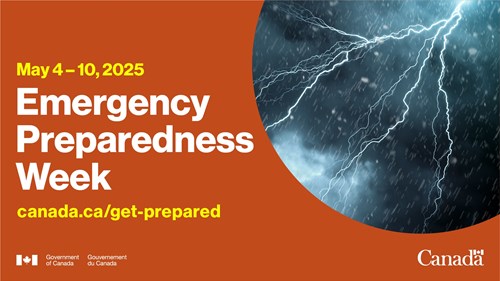
Please also check out the Emergency Preparedness Tab on our website
-
Lithium-ion Batteries
Don’t make these common mistakes when using and charging lithium-ion batteries
North Bay Fire and Emergency services offers these tips to keep you safeChances are there’s a lithium-ion battery you use on a daily basis, you might just not realize it. These types of batteries are common in everyday life, but lithium-ion batteries can also pose a hazard if not cared for properly.
With the rising use of lithium-ion batteries in everyday household items becoming more popular, North Bay Fire and Emergency Services offers these tips and advice to keep your home and your family safe.
Lithium-ion batteries differ compared to your typical alkaline AA, AAA or 9-volt batteries in that lithium-ion batteries are rechargeable and produce their own energy. Because of this, lithium-ion batteries pose a much greater fire risk.
Lithium-ion batteries can burn quickly and violently, often producing thick, black smoke within just a few seconds. Unlike other fires, these can burn at temperatures of over 1,000 degrees Celsius. That makes these fires difficult to extinguish, and in some cases, may require dry powder agents to put the fire out.
Common household uses for lithium-ion batteries
Many common devices, including scooters, e-bikes, vape pens, cordless vacuums, electric toothbrushes, children's toys, and power tools use these types of batteries. These products can be helpful around the home, but if used improperly, they could do more harm than good.
“Educating the public about the risks of lithium-ion batteries is very important and can minimize injuries or property damage caused by a fire,” said Chris Nichol, Fire Prevention Officer with North Bay Fire and Emergency Services. “These things are great to have, but if used improperly, these batteries can become very hazardous and unsafe.”
The lifespan of a lithium-ion battery varies and can span from anywhere to two to ten years. Battery life is also affected by the number of times it's charged and by outside factors such as temperature.
Tips to safeguard yourself from lithium-ion battery dangers
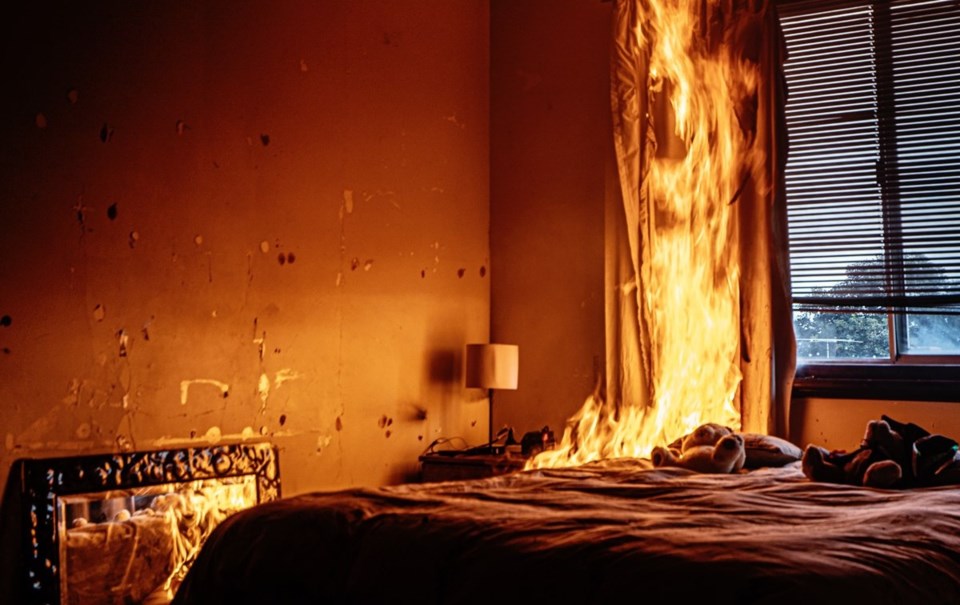
So how can you keep your home and your family safe? First and foremost, always read the manufacturer’s instructions. This will indicate how long you should charge an item and will caution against what not to do with your batteries.
“Whatever it is you’re using, always check the manufacturer’s instructions,” FPO Nichol said. “People always throw that stuff out, but you can go on Google and find that information online. Knowing what you own and how you’re using it can reduce fires and also extend the life of the battery.”
Although it might be tempting to order a cheaper off-brand replacement battery online, you should always stick with the original manufacturer’s battery to go along with the product. These batteries are designed to fit and operate in your device, while off-brand batteries might not meet the required specifications.
It is always best practice to follow the manufacturer’s instructions when it comes to installation, maintenance and use, safe charging practices and decommissioning when it comes to any device, especially one that is powered by lithium-ion batteries.
North Bay Fire and Emergency Services suggests only charging these devices when you are present, alert and never leave them in your path of exiting if needed. When a fire or explosion happens, you want a clear path to exit the room or area without having to go through or near smoke and the fire.
Lithium-ion batteries should also be disposed in a proper manner. These can be dropped off at an approved facility like the North Bay Household Hazardous Waste Depot, located at 112 Patton Street, North Bay. They are open Wednesdays through Saturdays from 8:00 am to 6:00 pm.
In the event of a fire, exit the area immediately and call 911
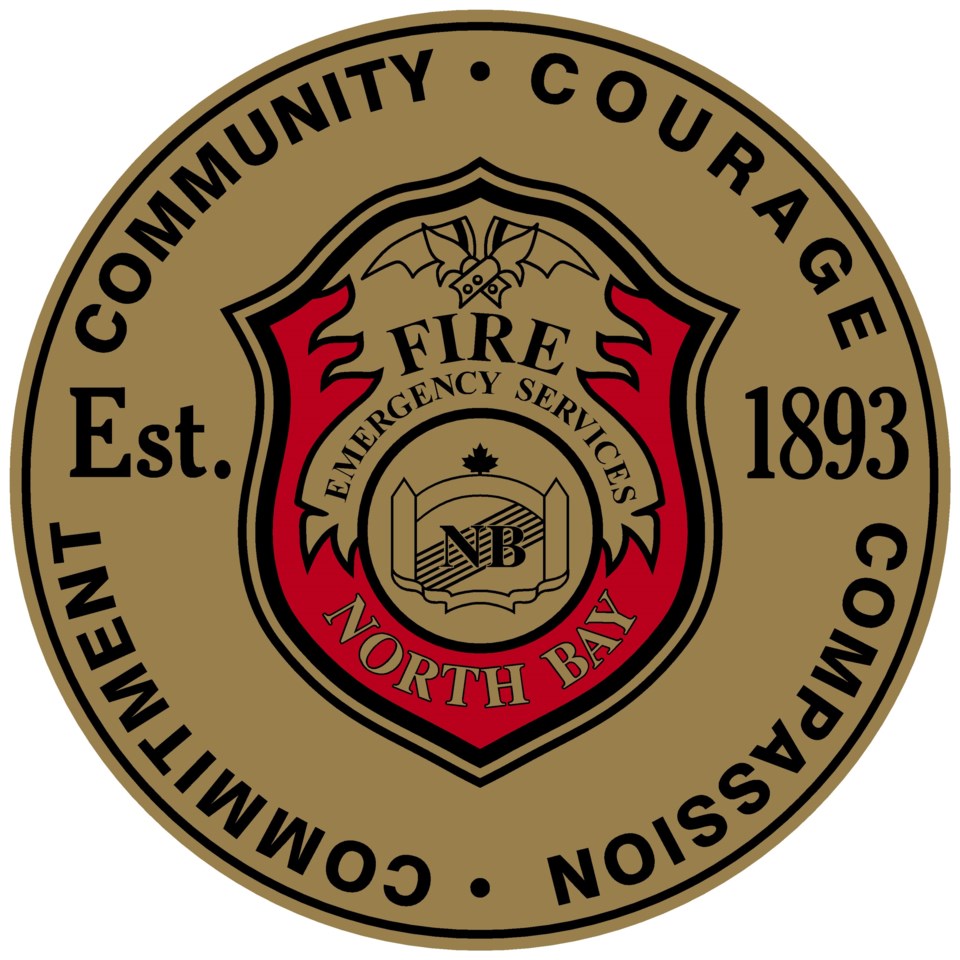
If a lithium-ion battery catches fire in your home, North Bay Fire and Emergency Services advises homeowners to get out of the area as soon as possible and call 911.
“If a fire were to occur in your presence, you are going to immediately notify anyone in that room or area to quickly evacuate at the nearest exit, ensuring to completely close the door behind them. Closing the door will contain the smoke and fire to that original room or area and not spread to other parts that may be an exit path for you and other occupants,” FPO Nichol said.
“You want to leave the building immediately, call 911 and stay outside until fire crews arrive. If your building is equipped with a fire alarm system, activate a pull station on your way out to notify the rest of the building occupants of the fire situation.”
To learn more about the potential dangers of lithium-ion batteries and best practices to follow for these batteries, contact North Bay Fire and Emergency Services at 705-474-5662
-
May 2025
Emergency Preparedness Week
🎒💧 Calling all superheroes! It's Emergency Preparedness Week! Time to assemble your power
kit with water, non-perishable snacks, and first-aid goodies. What's your must-have item?📝🏠 Family meeting time! Let's plan our superhero rendezvous spots for emergencies. One in
the neighborhood, one out. Where's your family's secret hideout?🔌💨💧 Become a home utility ninja! Learn to shut off electricity, gas, and water like a pro. It's
your secret weapon in emergencies. Share your shut-off valve selfie!🎉🛠️ Gather your loved ones and create your very own emergency kit together! Set a timer and
see who can pack the most essential items in 5 minutes. Share your kit selfies and tag us! Let’s
make preparedness a family affair!📱🚨 Stay in the loop to stay safe! Sign up for local emergency alerts. It's like having a personal
safety DJ keeping you informed. What's your go-to alert app?☎️ 📞 Time for a contact list glow-up! Update those emergency numbers and make sure
everyone's got a copy. Who's your "In Case of Zombie Apocalypse" person?📄💼 Give your insurance policy some love! Make sure you're covered for everything from floods
to alien invasions (okay, maybe not aliens). What's the weirdest thing your policy covers?
#InsuranceCheckLong Weekend Safety Tips
Grilling / Outdoor Cooking-
- Only use BBQs and grills outdoors, away from siding and deck railings.
- Clean your BBQ regularly. Remove grease or fat buildup from the grills and trays
- Never leave your BBQ unattended. Designate a 'grill master' to watch it at all times.
- Keep children and pets at least three feet away from the grill area.
- If you smell gas while cooking, immediately get away from the grill and call the fire department.
- Use long-handled utensils to avoid burns and splatters when grilling
- Dispose of hot coals properly - douse with plenty of water, and never put them in plastic, paper or wooden containers.
Fireworks-
- The safest way to enjoy the sparkle and bang is by attending a public
- display run by trained pros. Sit back, relax, and let the experts light up the sky!
- Never let young ones handle fireworks. Even sparklers can pack a punch
- and cause serious burns. Lets keep the little ones safe while we enjoy the show!
- Be Prepared! Keep a bucket of water or a garden hose nearby during your firework
- festivities. Its your safety sidekick in case of any surprises! Stay safe and have fun!
- Fireworks should be lit one at a time—then step back quickly! And
- remember, if it doesnt go off, dont relight it. Safety is the best kind of spark! Never carry fireworks in your pocket or shoot them off in metal or glass containers. Lets keep the fun explosive-free and safe!
- After the fireworks finish burning, douse them with plenty of water before tossing them out. Safety first, even when its all over!
- Fireworks can be stressful for our furry friends. Keep them indoors and comfy during the celebrations to ensure they feel safe and sound!
Check out North Bay’s firework bylaw for more information on our cities regulations
Remember to always check our website for the fire ratings. When burning make sure to have a valid burn permit, have the correct burning device, only burn between 6pm - midnight and follow all other rules and regulations for burning in our city limits.
- Only use BBQs and grills outdoors, away from siding and deck railings.
-
April 2025
Spring Cleaning Fire Safety
Spring cleaning time! Clear clutter from exits and stairs to ensure a quick escape in case of fire. 🧹🚪
While dusting, check that your smoke alarms are free from cobwebs and dust for optimal performance. 🕷️🚨
Cleaning out the garage? Store flammable liquids in approved containers away from heat sources. 🛢️🔥
Don't forget to clean your dryer lint trap and vent - it's a common cause of house fires! 👕🔥
Inspect all electrical cords for fraying or damage during your spring clean. Replace any that look worn. 🔌⚡
Clean your stove and oven thoroughly to prevent grease buildup - a major fire hazard. 🍳✨
After spring cleaning, test all smoke alarms to ensure they're working properly. Safety first! 🔔✅
Dryer Fire Safety
🧺 Did you know? Failing to clean your dryer lint filter after every load can lead to a fire! Make it a habit and keep your home safe. A few seconds can save lives! #DryerSafety #FirePrevention🔍 Check your dryer vent! A clogged vent can cause overheating and fires. Clean it out regularly and consider having it professionally inspected once a year. Stay safe! #LintTrap #HomeSafety
🔥 Never leave your dryer running unattended! If you’re stepping out, turn it off first. Your laundry can wait, but your safety can’t! #SafetyFirst #DryerFireAwareness
🚫 Avoid overloading your dryer! It can cause overheating and increase the risk of fire. Follow the manufacturer's guidelines for load sizes to keep things safe! #LaundryTips #FireSafety
🧼 Use dryer sheets wisely! They can leave residue that builds up in your lint trap. Make sure to clean it regularly to prevent fires. Safety is in the details! #DryerMaintenance #FirePrevention
📅 Schedule a regular dryer maintenance check! Inspect hoses for wear and tear, and replace them if necessary. A little upkeep goes a long way in fire prevention! #HomeCare #DryerSafety
🚨 Have a fire escape plan! In case of a dryer fire, know how to get out safely and where to meet outside. Practice makes perfect—make it a family activity! #FireEscapePlan #SafetyMattersSpringKitchen Fire Safety
👨 🍳🍳 Cooking up something delicious? Never leave it unattended! Stay in the kitchen while frying, grilling, or broiling. Your culinary masterpiece deserves your full attention – and so does your safety!
🧤🔥 Keep your kitchen safe and stylish! Store flammable items like oven mitts and wooden utensils away from the stovetop. Let’s keep the flames where they belong—under control!
🍳🚫💧 Grease fire emergency? Slide a lid over the pan and turn off the burner—never use water! You’ll be the hero of your kitchen with this quick move!
🧯👍 Be a kitchen safety champ! Keep a fire extinguisher handy and know how to use it. A little preparation can make a big difference in an emergency!
👚🔥 Cooking fashion tip: Avoid loose-fitting clothing while whipping up your favorite dishes. Stay stylish and safe—let’s keep those flames at bay!
🧼🔥 Give your oven some TLC! Regular cleaning helps prevent grease buildup and keeps potential fires at bay. A clean oven is a happy oven!
👧👦🚫 Create a “kid-free zone” of at least 3 feet around the stove and hot food prep areas. Safety first means peace of mind for everyone in the kitchen!
-
March 2025
Essential Safety Tips for Apartment and Condo Residents
🏢 High-rise dwellers! Know your escape routes. Find at least two ways out from every room in your apartment. Practice in the dark - you might need to escape that way! #HighRiseSafety#EscapePlan
🚪 Fire doors save lives! Never prop them open or block them. They're designed to slow fire spread, giving you precious escape time. Keep them closed and clear! #FireSafety#ApartmentLiving
Fire in your building? Forget the elevator! Always use the stairs to escape. Elevators may be unavailable, get called to the ground floor, or stop on fire-affected floors. Stairs are your lifeline!#SafetyFirst #HighRiseHacks
🚨 Hear that alarm? Act fast! Every second counts in a high-rise fire. Don't wait to see what others do - start your escape immediately. Your quick action could save your life! #FireAlarm#QuickResponse
🔑 Know your building's crossover floors. These unlocked levels let you switch stairwells if needed. It could be your backup escape route! #HighRiseTips #FireEscape
🚒 In a high-rise fire and can't escape? Close your door, stuff towels in cracks, and call 911.Open a window slightly and signal for help. Firefighters will find you! #StaySafe #FireRescue
🏠 Your condo, your responsibility! Install smoke alarms, test them monthly, and replace batteries yearly. Early warning is crucial in high-rise fires. #SmokeSavesLives #ApartmentSafety
Daylight Saving Fire Safety !!
⏰🌼 Spring forward safely! As you set your clocks ahead, don’t forget to change those smoke
alarm batteries too! Let’s keep the spring vibes bright and safe! #DaylightSavings #SpringIntoSafety🔋🌷New season, new batteries! Give your safety devices some love this spring. A little power boost goes a long way in keeping your home safe! #BatteryCheck #SpringSafety
🌞🚪Daylight saving is the perfect time to refresh your home fire escape plan! Gather the family and practice your escape routes—safety can be a fun family activity! #SafetySpringForward
#FamilyFun🌅🏡Longer days are here! Use that extra daylight to check your home's exterior for fire hazards. Let’s keep our homes beautiful and safe this spring! #OutdoorSafety #SpringCleaning
💖 Don’t forget about your CO alarms when changing batteries! They need some love too. Keep your home safe and sound—because every device deserves a little TLC! #COSafety
#SafetyFirstLucky and Secure: Your Guide to Fire Safety This St. Patrick's Day
🍀✨ Going green for St. Patrick's Day? Let’s keep it safe in the kitchen! Always stay close while cooking—don’t let your feast turn into a fire hazard! #StPatricksSafety #CookWithCare
🍀🔥 The luck of the Irish won’t save you from a fire! But working smoke alarms will! Give yours a quick check today—safety is the best charm! #LuckySafety #SmokeAlarmCheck
🎉🍀 Planning a St. Patrick's bash? Keep those festive decorations away from heat sources! Let’s celebrate safely and keep the fun going all night long! #SafeCelebration #PartySmart
👩 🍳🍻 Designate a sober chef for your St. Patrick's feast! Safety first, then let the shenanigans begin! Keep the kitchen fun and fire-free! #SafeCooking #ShenanigansApproved
🚒🍀 Don’t just rely on the luck o' the Irish! Be prepared with a fire extinguisher in case of kitchen mishaps. Stay safe and enjoy your celebrations! #PreparedNotLucky #FireSafetyFirstWeek
Stay Safe While You Power Up: Lithium Battery Fire Safety Essentials🔋
🔋 Let's get charged up about keeping our gadgets (and ourselves) safe! Remember: Choose certified products, Handle with care, Always stay alert, Recycle properly, Get out if there's fire, and Educate others! 🔥🚫 #CHARGEintoBatterySafety
🛒 Shopping for new gadgets? Look for the seal of approval! Certified products are like VIP passes to safety. Don't let uncertified bargains crash your party! 🏆 ✅ #ChargedForLife #BatterySafety
🤗 Show your batteries some love! Use the right charger, keep them cool, and never leave them charging overnight. Treat them right, and they'll return the favor! 💕 🔌 #HandleWithCare #BatteryLove
👀 Be a battery detective! Watch for swelling, strange noises, or funky smells. If something seems off, it's time to say goodbye to that battery. Better safe than sorry!
-
February 2025
Burn Awareness 🔥
🔥✨ It’s Burn Awareness Week! Let’s kick off with a reminder: keep flammable items away from heat sources. Safety starts at home! #BurnAwareness #SafetyFirst
🚫💧 Scalds can happen in an instant! Always test your bath water before jumping in, especially for little ones. Stay safe and enjoy the warmth! #ScaldPrevention #BurnSafety
🍳🔥 Cooking is the leading cause of home burns! Never leave food unattended on the stove. Keep your kitchen safe and your meals delicious! #CookingSafety #BurnAwareness
🛠️💡 Check your electrical cords! Frayed or damaged cords can spark fires. Inspect them regularly to keep your home safe this winter! #ElectricalSafety #BurnPrevention
🚒📚 Educate yourself and your family about burn first aid! Cool the burn with water, cover it, and seek help if needed. Knowledge is power! #BurnFirstAid #StayInformed
🎉👶 Kids are curious! Keep matches, lighters, and flammable liquids out of reach. Teach them about fire safety early to prevent accidents later! #FireSafetyForKids #BurnAwareness
🌟🏠 Make a fire escape plan with your family! Practice it together so everyone knows what to do in case of an emergency. Safety is a family affair! #FireEscapePlan #FamilySafety
-
January 2025
Winter Fire Safety ❄️
It's cold outside! ❄️ Remember to keep portable heaters away from curtains and furniture.#WinterFireSafety
Fireplace season is here! Always use a screen to catch flying sparks. #CozyAndSafe
Thawing pipes? Never use an open flame. Use a hair dryer or heating pad instead.#SafeThawing
Layer up, not your outlets! Avoid overloading electrical sockets with winter appliances.#ElectricalSafetyIce and snow on your roof? Clear it safely to prevent damage and potential fire hazards.#WinterMaintenance
❄️🚫 Don’t let snow block your dryer and exhaust vents this winter! Clearing them helps prevent dangerous carbon monoxide buildup. Stay cozy and safe—make it part of your winter routine!#WinterSafety #COAwareness #BreatheEasy
-
12 days of holidays safety
Each day, for 12 days leading up to Christmas, we'll be sharing a safety tip and giving you an opportunity to win a daily prize package retail valued at $95.00. Please listen to the radio for your chance to win.












-
December Education
General Holiday safety tips
- Keep any entry/exits in your home cleared from snow.
- Test your smoke and carbon monoxide alarms before gatherings.
- Keep candles up and away from children and pets and never left unattended
- Have heating equipment, chimneys and furnace/boiler vents cleaned and inspected every year by a qualified professional.
Cooking
- Unattended cooking is the number one cause of home fires in Ontario
- Be attentive. If you are drowsy or have consumed alcohol don’t use the stove, oven, barbeque or any other cooking appliance.
- Ensure you are checking your cooking food regularly. Use a timer to remind yourself to check.
- Keep any flammable objects such as wooden utensils, food packaging, or towels off of and away from your stovetop.
Christmas Trees & Holiday Lightings
- Keep live trees watered and check the stand reservoir daily to ensure the tree does not dry out too quickly. Pick an area away from any fireplaces or baseboard/water radiators
- Always use CSA and/or UL approved lights, extension cords and power bars/surge protectors
- Ensure you do not overload any extension cords, power bars or outlet adapters. Refer to the manufacturer’s instructions
- Make sure to turn off all lights before leaving the house, when you go to bed or when you will not be in the room for an extended period of time.
- Plug outdoor lights and decorations into ground fault circuit interrupters (GFCIs) or outlets protected by a GFCI.

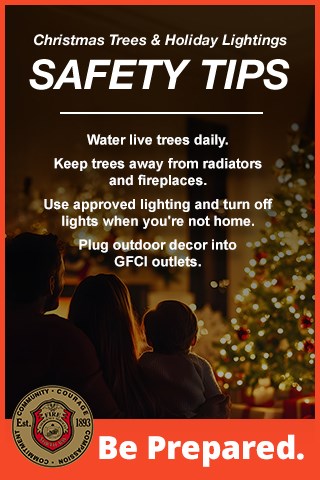
Check out the link below to see an article on our Fire Department and Enbridge Gas pairing up this holiday season!
Fire department receives support from Enbridge - My North Bay Now
#ENBfuelingfutures @enbridgegas
The North Bay Fire Department received 250 combination smoke and carbon monoxide detectors to improve home safety and save lives. Safe Community Project Zero is a public education campaign, supported by the Fire Marshal’s Fire Safety Council, that is providing more than 14,500 alarms to residents in 75 communities across Ontario. The department will be working with community partners to find homeowners that fit the needs of the Safe Community Project Zero Campaign.
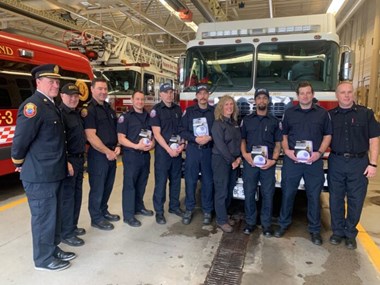
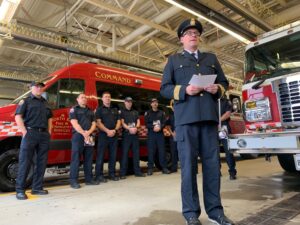
-
November Education
Carbon Monoxide Awareness Week
The Hawkins Gignac Act, 2013 proclaims the week beginning on November 1 of each year as Carbon Monoxide Awareness Week. No matter which day of the week it is, November 1 always is the start of Carbon Monoxide Awareness Week.
“10 years later, we have seen heightened awareness of the seriousness of the issue and have updated the Ontario Fire Code to mandate CO alarms in all homes with fuel-burning appliances, fireplace, or attached garages. We’ve seen the tremendous difference this has made in protecting Ontario families but the responsibility to test and maintain alarms is ongoing.” - Jon Pegg, Ontario Fire Marshal
Facts:
- Many homes in Ontario have an average of 4-6 fuel-burning appliances that produce CO.
-Landlords must ensure CO alarms are installed and maintained in rental properties.
Tenants, remember to test your CO alarms every month by simply pressing the test button. It's against the law for tenants to remove the batteries or tamper with CO alarms in any way.-It's the law! Install carbon monoxide alarms. If you have fuel-burning appliances, install CO alarms adjacent to all sleeping areas.
- Install CO alarms outside all sleeping areas if your home has an attached garage.
Test CO alarms monthly and change the batteries once a year.- Get an annual inspection of fuel-burning appliances and vents by a registered contractor. Prevent CO poisoning and install CO alarms adjacent to all sleeping areas.
- Get an annual inspection of fuel-burning appliances and vents by a registered contractor. It could save you from deadly CO poison.
- Get an annual inspection of fuel-burning appliances and vents by a registered contractor.
It could save you from deadly CO poison.- Credit to the Ontario Office of the Fire Marshall
-
October Education
October is a busy month. We have CIBC, Fire Prevention Week & our Halloween event for the community.
CIBC - We have crew members raising money until the end of the month. If you would like to donate here is our link; North Bay: North Bay Firefighters - CIBC Run for the Cure (cancer.ca) .
Fire Prevention Week - Make them WORK for you - runs October 6th - 12th. Emphasizing the importance of having a working smoke alarm. Fill -a-Fire-Truck also happens during the week with collecting donations for the North Bay Food Bank while educating the community on fire safety.
Halloween night - Haunted house - is an event we have back for the community. With that comes the need for Candy donations for the night of. Drop off of any donations are welcomed either at our front desk from 8:30-4:30 or anytime at the back door location on Victoria Street.
CIBC Highlights





Fire Prevention Week & Fill a Fire Truck Highlights






Halloween



-
September Education
Test your Smoke Alarm Day - September 28th



Campaign
September 28 is Ontario's Test Your Smoke Alarm Day! In response to 133 fire fatalities Ontario suffered in 2022 – the most in 20 years – Test Your Smoke Alarm Day was launched to encourage all Ontarians to learn more about smoke alarms, fire safety, and home fire escape planning, which can save the lives of you and your loved ones. Most importantly, we want you to test your smoke alarms! We've created free, downloadable resources in multiple languages so everyone can share this safety message.
Visit: Saved by the beep to learn more
Put on by Fire Marshal’s Public Fire Safety Council.



-
Summer Education



Fire Statistics:
8% of annual loss fires occur in August
Average of 38 injuries
Average of 5 fatalities
TOP IGNITION SOURCES:
Cooking Equipment
Cigarettes
Electrical distribution equipment (extension cords, power bars, surge protectors)

-
June's Education
Cottage Fire Safety Tips
To minimize the risk of fire and burn injury, the fire service recommends the following cottage fire safety tips:
Install smoke alarms on every storey and outside all sleeping areas. It’s the law for all Ontario homes, cottages, cabins and seasonal homes to have working smoke alarms on every storey and outside all sleeping areas.
- Test smoke alarms at least monthly or each time you return to the cottage. Pack a new smoke alarm and extra smoke alarm batteries in case they need replacement.
- Install and ensure carbon monoxide alarms in your cottage if it has a fuel-burning appliance.
- Develop and practice a home fire escape plan to ensure everyone knows what to do if the smoke alarm sounds.
- Know the telephone number for the local fire department and your cottage’s emergency sign number, in case of emergency.
- Clean barbecues before using them. Keep an eye on lit barbecues and ensure all combustibles, as well as children and pets are kept well away from them. Fires can happen when barbecues are left unattended.
- Keep barbecue lighters and matches out of sight and reach of children.
- Remember to bring a flashlight with extra batteries.
- Check heating appliances and chimneys before using them.
- Check with your local fire department, municipality, or Ministry of Natural Resources to determine whether open air burning is permitted before having a campfire or burning brush. If open burning is allowed, fires should be built on bare soil or on exposed rock. Remove leaves and twigs from around the fire to keep it from spreading. Always keep a bucket of water, sand, or even a shovel close by and supervise the fire at all times.
- If you must smoke, do so outside. Keep a large can with water nearby so cigarette butts can be safely discarded. If you drink, do so responsibly. Tobacco use and excessive alcohol consumption are contributing factors in many fires and can lead to serious injuries.
- Burn candles in sturdy candleholders that will not tip and are covered with a glass shade. When you go out, blow out!
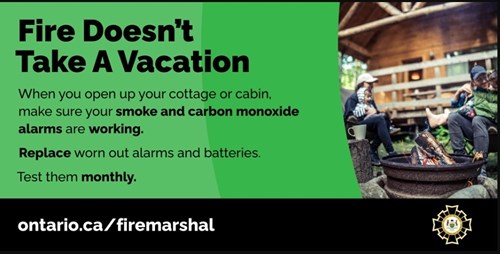
-
May's Education
FireSmart begins at Home!!
Wildfires have increased over recent years leaving many communities in ruins and many homes destroyed. It’s time to “Begin your FireSmart Journey” starting in and around your home and neighborhood.
North Bay Fire and Emergency Services are encouraging you to help build and maintain a wildfire resiliency up to 30 metres around your home. There are many factors that may impact your property’s risk to wildfire so visiting www.FireSmartCanada.ca is your first step to protecting your home.
Many resources are available to the homeowner such as “FireSmart Begins at Home Guide” or the FireSmart 101 online course. This free 1-hour course will walk you through the 3 “Home Ignition Zones” around your home teaching you how to reduce the risks on your property starting from your home and working outwards. It is also recommended to download the FireSmart Begins at Home App. to help you coordinate your efforts while on the go.
Remember Fire Safety starts with you!!
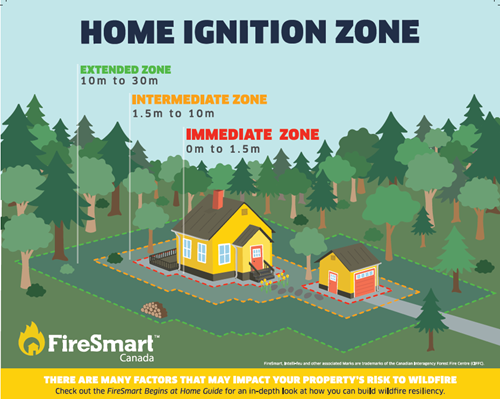


-
April's Education
Open Air Burning
Open Air Burning By-law Amendment
Open Air Burning By-law 2015-115
Hours of Burning is 6:00pm-12:00am.
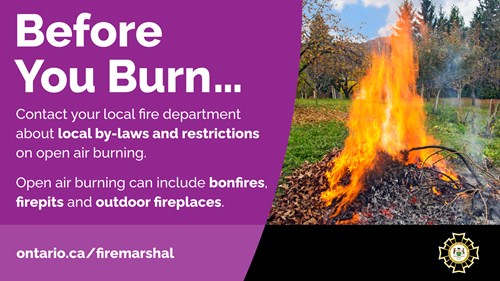
You MUST have a valid permit to burn.
Make sure to read all the requirements on your permit to make sure you are properly burning.
Check the Forest Fire Map to keep up to date on the fire ratings and when we are in a fire ban.
Please see our Burn Permit section on our website for more information.
BBQ Tips
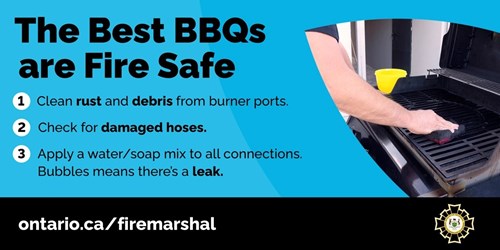
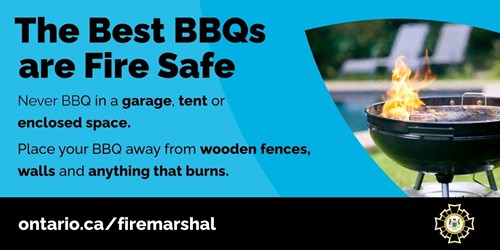
-
© Copyright 2014 City of North Bay
